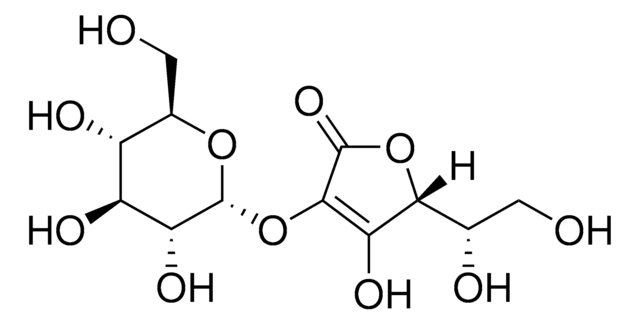A1968
Ascorbic acid 6-palmitate
meets USP testing specifications
Synonym(s):
6-O-Palmitoyl-L-ascorbic acid, L-Ascorbic acid 6-hexadecanoate, L-Ascorbyl palmitate, Ascorbic acid 6-palmitate, NSC 402451
About This Item
Recommended Products
biological source
synthetic
Quality Level
Agency
USP/NF
meets USP testing specifications
Assay
95.0-100.5%
form
powder
color
light yellow
application(s)
pharmaceutical (small molecule)
SMILES string
CCCCCCCCCCCCCCCC(=O)OC[C@H](O)[C@H]1OC(=O)C(O)=C1O
InChI
1S/C22H38O7/c1-2-3-4-5-6-7-8-9-10-11-12-13-14-15-18(24)28-16-17(23)21-19(25)20(26)22(27)29-21/h17,21,23,25-26H,2-16H2,1H3/t17-,21+/m0/s1
InChI key
QAQJMLQRFWZOBN-LAUBAEHRSA-N
Looking for similar products? Visit Product Comparison Guide
General description
Biochem/physiol Actions
Signal Word
Warning
Hazard Statements
Precautionary Statements
Hazard Classifications
Eye Irrit. 2
Storage Class Code
11 - Combustible Solids
WGK
WGK 1
Flash Point(F)
Not applicable
Flash Point(C)
Not applicable
Personal Protective Equipment
Choose from one of the most recent versions:
Certificates of Analysis (COA)
Don't see the Right Version?
If you require a particular version, you can look up a specific certificate by the Lot or Batch number.
Already Own This Product?
Find documentation for the products that you have recently purchased in the Document Library.
Customers Also Viewed
Our team of scientists has experience in all areas of research including Life Science, Material Science, Chemical Synthesis, Chromatography, Analytical and many others.
Contact Technical Service






